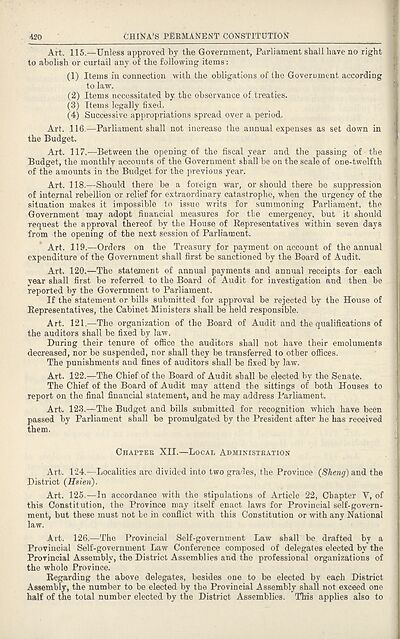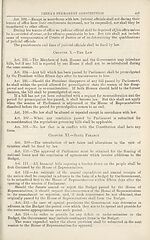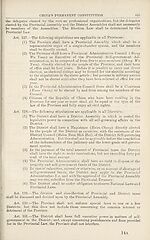1924
(476) Page 420
Download files
Complete book:
Individual page:
Thumbnail gallery: Grid view | List view

420
CHINA'S PERMANENT CONSTITUTION
Art. 115.—Unless approved by the Government, Parliament shall have no right
to abolish or curtail any of the following items:
(1) Items in connection with the obligations of the Goverument according
to law.
(2) Items necessitated by the observance of treaties.
(3) Items legally fixed.
(4) Successive appropriations spread over a period.
Art. 116.-—Parliament shall not increase the annual expenses as set down in
the Budget.
Art. 117.—Between the opening of the fiscal year and the passing of the
Budget, the monthly accounts of the Government shall be on the scale of one-twelfth
of the amounts in the Budget for the previous year.
Art. 118.—Should there be a foreign war, or should there be suppression
of internal rebellion or relief for extraordinary catastrophe, when the urgency of the
situation makes it impossible to issue writs for summoning Parliament, the
Government may adopt financial measures for the emergency, but it should
request the approval thereof by the House of Representatives within seven days
from the opening of the next session of Parliament.
Art. 119.—Orders on the Treasury for payment on account of the annual
expenditure of the Government shall first be sanctioned by the Board of Audit.
Art. 120.—The statement of annual payments and annual receipts for each
year shall first be referred to the Board of Audit for investigation and then be
reported by the Government to Parliament.
If the statement or bills submitted for approval be rejected by the House of
Representatives, the Cabinet Ministers shall be held responsible.
Art. 121.—The organization of the Board of Audit and the qualifications of
the auditors shall be fixed by law.
During their tenure of office the auditors shall not have their emoluments
decreased, nor be suspended, nor shall they be transferred to other offices.
The punishments and fines of auditors shall be fixed by law.
Art. 122.—The Chief of the Board of Audit shall be elected by the Senate.
The Chief of the Board of Audit may attend tbe sittings of both Houses to
report on the final financial statement, and he may address Parliament.
Art. 123.—The Budget and bills submitted for recognition which have been
passed by Parliament shall be promulgated by the President after he has received
them.
Chapter XII.—Local Administration
Art. 124.—Localities are divided into two grades, the Province (Sheng) and the
District (Hsien).
Art. 125.—In accordance with the stipulations of Article 22, Chapter Y, of
this Constitution, the Province may itself enact laws for Provincial self-govern¬
ment, but these must not he in conflict with this Constitution or with any National
law.
Art. 126.—The Provincial Self-government Law shall be drafted by a
Provincial Self-government Law Conference composed of delegates elected by the
Provincial Assembly, the District Assemblies and the professional organizations of
the whole Province.
Regarding the above delegates, besides one to be elected by ea,ch District
Assembly, the number to be elected by the Provincial Assembly shall not exceed one
half of the total number elected by the District Assemblies. This applies also to
CHINA'S PERMANENT CONSTITUTION
Art. 115.—Unless approved by the Government, Parliament shall have no right
to abolish or curtail any of the following items:
(1) Items in connection with the obligations of the Goverument according
to law.
(2) Items necessitated by the observance of treaties.
(3) Items legally fixed.
(4) Successive appropriations spread over a period.
Art. 116.-—Parliament shall not increase the annual expenses as set down in
the Budget.
Art. 117.—Between the opening of the fiscal year and the passing of the
Budget, the monthly accounts of the Government shall be on the scale of one-twelfth
of the amounts in the Budget for the previous year.
Art. 118.—Should there be a foreign war, or should there be suppression
of internal rebellion or relief for extraordinary catastrophe, when the urgency of the
situation makes it impossible to issue writs for summoning Parliament, the
Government may adopt financial measures for the emergency, but it should
request the approval thereof by the House of Representatives within seven days
from the opening of the next session of Parliament.
Art. 119.—Orders on the Treasury for payment on account of the annual
expenditure of the Government shall first be sanctioned by the Board of Audit.
Art. 120.—The statement of annual payments and annual receipts for each
year shall first be referred to the Board of Audit for investigation and then be
reported by the Government to Parliament.
If the statement or bills submitted for approval be rejected by the House of
Representatives, the Cabinet Ministers shall be held responsible.
Art. 121.—The organization of the Board of Audit and the qualifications of
the auditors shall be fixed by law.
During their tenure of office the auditors shall not have their emoluments
decreased, nor be suspended, nor shall they be transferred to other offices.
The punishments and fines of auditors shall be fixed by law.
Art. 122.—The Chief of the Board of Audit shall be elected by the Senate.
The Chief of the Board of Audit may attend tbe sittings of both Houses to
report on the final financial statement, and he may address Parliament.
Art. 123.—The Budget and bills submitted for recognition which have been
passed by Parliament shall be promulgated by the President after he has received
them.
Chapter XII.—Local Administration
Art. 124.—Localities are divided into two grades, the Province (Sheng) and the
District (Hsien).
Art. 125.—In accordance with the stipulations of Article 22, Chapter Y, of
this Constitution, the Province may itself enact laws for Provincial self-govern¬
ment, but these must not he in conflict with this Constitution or with any National
law.
Art. 126.—The Provincial Self-government Law shall be drafted by a
Provincial Self-government Law Conference composed of delegates elected by the
Provincial Assembly, the District Assemblies and the professional organizations of
the whole Province.
Regarding the above delegates, besides one to be elected by ea,ch District
Assembly, the number to be elected by the Provincial Assembly shall not exceed one
half of the total number elected by the District Assemblies. This applies also to
Set display mode to:
![]() Universal Viewer |
Universal Viewer | ![]() Mirador |
Large image | Transcription
Mirador |
Large image | Transcription
Images and transcriptions on this page, including medium image downloads, may be used under the Creative Commons Attribution 4.0 International Licence unless otherwise stated. ![]()
| Asian directories and chronicles > 1924 > (476) Page 420 |
|---|
| Permanent URL | https://digital.nls.uk/196430097 |
|---|
| Attribution and copyright: |
|
|---|---|
| Description | Volumes from the Asian 'Directory and Chronicle' series covering 1917-1941, but missing 1919 and 1923. Compiled annually from a multiplicity of local sources and research. They provide listings of each country's active corporations, foreign residents and government agencies of all nationalities for that year, together with their addresses. Content includes: various treaties; coverage of conflicts; currencies and taxes; consular fees; weights and measures; public holidays; festivals and traditions. A source of information for both Western states and communities of foreigners living in Asia. Published by Hongkong Daily Press. |
|---|---|
| Shelfmark | H3.86.1303 |
| Additional NLS resources: |

